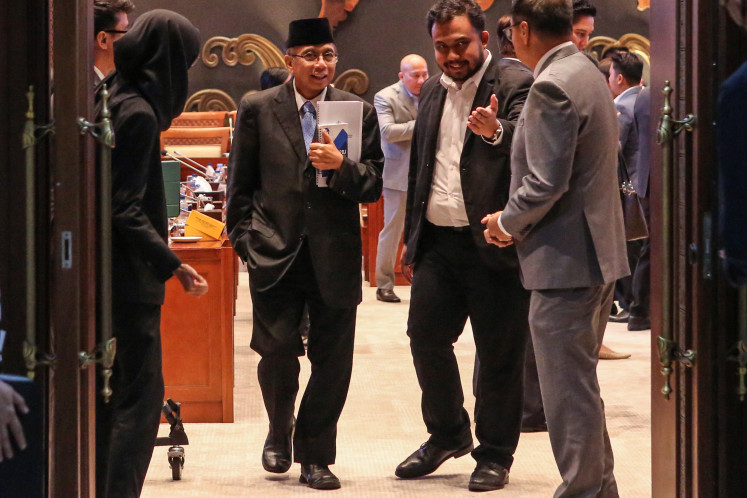Popular Reads
Top Results
Can't find what you're looking for?
View all search resultsPopular Reads
Top Results
Can't find what you're looking for?
View all search resultsFashion Flair: Lulu Lutfi Labibi: Rising from imperfection
Lulu Lufti Labibi at his home studio: JP/Bambang MuryantoLulu Lutfi Labibi, a rising fashion designer star, maintains an artistic showroom as part of his old house in Kotagede, Yogyakarta
Change text size
Gift Premium Articles
to Anyone
Lulu Lufti Labibi at his home studio: JP/Bambang Muryanto
Lulu Lutfi Labibi, a rising fashion designer star, maintains an artistic showroom as part of his old house in Kotagede, Yogyakarta.
Recycled cow-barn frames support its roof, which provides shelter for his display of some of his fashion pieces. The showroom occupies a former warehouse and has partially collapsed walls. Several photos recording his works of art are also displayed.
His “magical touch” seems to have converted the slummy, spooky warehouse into an attractive showroom thanks to the Japanese philosophy of wabi-sabi art he embraces, believing that serene beauty can appear from imperfection, impermanence and incompleteness.
It’s this philosophy that makes Lulu create “imperfect” clothing with asymmetric cutting, only one arm and strings instead of buttons. In Lulu’s hands, such garments turn into artistic, exclusive, comfortable designs that enable people to modify them as they wear them.
“I make clothes using the draping technique, without following patterns. I pull and cut here and there with unique results. This technique has always been interesting because it gives rise to surprises at the end of the process,” he noted.
Lulu is fond of using traditional material such as lurik (striped hand-woven fabric), cotton and batik when producing his modern attire. His batik clothes are also “victimized” by his wabi-sabi as they bear irregular motifs.
At the start of his venture in 2012, not many people were interested in Lulu’s products, which were mostly made of traditional lurik fabric. He recalled that he had to sell the garments he designed from door to door.
However, after a long and winding business journey, his wardrobe is now in high demand.
“At weekends, many people fly to Yogyakarta especially to buy my clothes,” the Indonesian Arts Institute (ISI) of Yogyakarta graduate said.
On social media, a lot of upper-middle class youths and celebrities proudly show themselves dressed in Lulu’s designs. The rising fame of Lulu’s attire has at the same time boosted the popularity of lurik, which had been on the wane.
With two outfits created by Lulu, freelance photojournalist Regina Safri said she liked the clothes because of their distinctive, funny and smart design, besides the pleasant feeling and greater self-confidence they generated, despite their fairly high price.
As his apparel becomes more widely known, Lulu has also often been invited to join fashion shows in Indonesia and abroad. He’s the first fashion designer from Indonesia to appear at the Annual Museum Quartier Vienna Fashion Week (MQVFW), which was held for the eighth time in Vienna in September 2016.
His artistic designs have also led him to various art collaborations. Lulu and the married couple Dyatmiko “Miko” Bawono and Santi Ariestyowanti (known as Indieguerrillas) were engaged in the performance art collaboration entitled Petruk Jadi Supermodel (Petruk becomes a Supermodel), presented at the opening of Artjog 2015 in Yogyakarta.
Indieguerrillas comprises artists who always offer traditional and modern elements in their works.
“We invited Lulu because he shares the same spirit. He has adopted lurik as his main material and turned it into something new, a modern Java,” said Santi.
Indiguerrillas, Lulu and musician Ari Wulu will again stage Petruk Jadi Supermodel in a new concept at the NTU Center for Contemporary Art Singapore in mid-January.
Eagerly anticipating the show, Lulu said, “After the Artjog 2015 collaboration with Indieguerrillas, I envisaged that the project should continue.”
Japan’s world-class director Hiroshi Koike also asked Lulu to design costumes for the Mahabharata part three theater shows in Yogyakarta and Jakarta in September 2016, as part of his big art project that will last for eight years, starting from 2013.
Lulu, the fifth of six siblings from Purwokerto, Central Java, also handled costumes for the art collaboration called Pada Suatu Rumah (In a House). The creation of dancer Sekar Sari was presented at Galeri Indonesia Kaya, Jakarta, in November last year.
A dancer and dance lecturer of Yogyakarta’s Institute of the Arts (ISI), Iwan Dadijono has made use of Lulu’s designs at least twice for his performances. In 2015, Lulu made Iwan’s costume for the dance Sisi Lain (The Other Side). “His designs are unique and well-suited to dancing,” said Iwan, who also performed in Pada Suatu Rumah.
In spite of his rocketing fame, Lulu has remained a modest figure. He claimed he had been simplifying his dreams, with no more obsessions or inclination to pursue his career even further by residing in Jakarta.
As of 2017, he is closing his boutique in Jakarta and all his fashion designs will only be available in Yogyakarta. “I’m getting even more unsuited to Jakarta life as my creative process can only be undertaken in Yogyakarta,” he revealed.
This is the reason that he bought an old house in Yogyakarta that combines with his boutique, as he had desired. Lulu’s house is close to nDalem Sopingen, which has been declared a cultural heritage building.
The building, with its traditional Javanese joglo architecture has high historic significance as the place where national independence fighters, like HOS Cokroaminoto, KH Ahmad Dahlan, Semaun and Alimin, used to gather and deliver speeches.
“If I lived in Jakarta, I wouldn’t be able to sweep my yard either,” added Lulu, who has long been keenly on house cleanliness.










